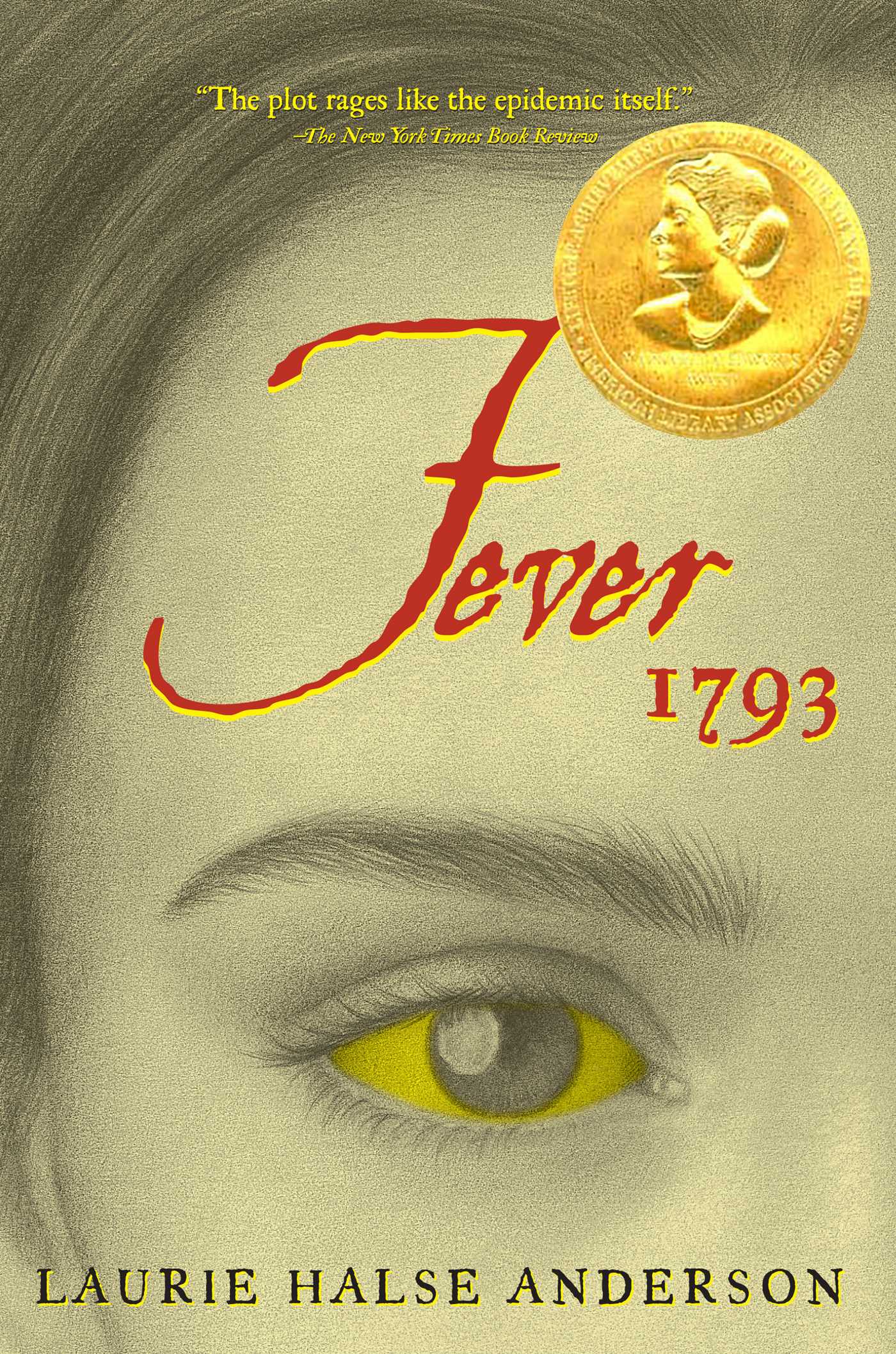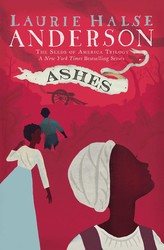Plus, receive recommendations and exclusive offers on all of your favorite books and authors from Simon & Schuster.
LIST PRICE $19.99
PRICE MAY VARY BY RETAILER
Get 30% off hardcovers with code MOM30, plus free shipping on orders of $40 or more. Terms apply.
Buy from Other Retailers
Table of Contents
About The Book
From Fever 1793
"Where's Polly?" I asked as I dropped the bucket down the well. "Did you pass by the blacksmith's?
"I spoke with her mother, with Mistress Logan," Mother answered softly, looking at her neat rows of carrots.
"And?" I waved a mosquito away from my face.
"It happened quickly. Polly sewed by candlelight after dinner. Her mother repeated that over and over, 'she sewed by candlelight after dinner.' And then she collapsed."
I released the handle and the bucket splashed, a distant sound.
"Matilda, Polly's dead."
August 1793. Fourteen-year-old Mattie Cook is ambitious, adventurous, and sick to death of listening to her mother. Mattie has plans of her own. She wants to turn the Cook Coffeehouse into the finest business in Philadelphia, the capital of the new United States.
But the waterfront is abuzz with reports of disease. "Fever" spreads from the docks and creeps toward Mattie's home, threatening everything she holds dear.
As the cemeteries fill with fever victims, fear turns to panic, and thousands flee the city. Then tragedy strikes the coffeehouse, and Mattie is trapped in a living nightmare. Suddenly, her struggle to build a better life must give way to something even more important -- the fight to stay alive.
"Where's Polly?" I asked as I dropped the bucket down the well. "Did you pass by the blacksmith's?
"I spoke with her mother, with Mistress Logan," Mother answered softly, looking at her neat rows of carrots.
"And?" I waved a mosquito away from my face.
"It happened quickly. Polly sewed by candlelight after dinner. Her mother repeated that over and over, 'she sewed by candlelight after dinner.' And then she collapsed."
I released the handle and the bucket splashed, a distant sound.
"Matilda, Polly's dead."
August 1793. Fourteen-year-old Mattie Cook is ambitious, adventurous, and sick to death of listening to her mother. Mattie has plans of her own. She wants to turn the Cook Coffeehouse into the finest business in Philadelphia, the capital of the new United States.
But the waterfront is abuzz with reports of disease. "Fever" spreads from the docks and creeps toward Mattie's home, threatening everything she holds dear.
As the cemeteries fill with fever victims, fear turns to panic, and thousands flee the city. Then tragedy strikes the coffeehouse, and Mattie is trapped in a living nightmare. Suddenly, her struggle to build a better life must give way to something even more important -- the fight to stay alive.
Reading Group Guide
Get a FREE ebook by joining our mailing list today! Plus, receive recommendations for your next Book Club read.
By clicking 'Sign me up' I agree to the Terms of Use and acknowledge the Privacy Policy and Notice of Financial Incentive. Free ebook offer available to NEW US subscribers only. Offer redeemable at Simon & Schuster's ebook fulfillment partner. Must redeem within 90 days. See full terms and conditions and this month's choices.
Reading Group Guide to
Fever 1793
By Laurie Halse Anderson
About the Book
August 1793. Fourteen-year-old Mattie Cook is ambitious, adventurous, and sick to death of listening to her mother. Mattie has plans of her own. She wants to turn the Cook Coffeehouse into the finest business in Philadelphia, the capital of the new United States.
But the waterfront is abuzz with reports of disease. “Fever” spreads from the docks and creeps toward Mattie’s home, threatening everything she holds dear.
As the cemeteries fill with fever victims, fear turns to panic, and thousands flee the city. Then tragedy strikes the coffeehouse, and Mattie is trapped in a living nightmare. Suddenly her struggle to build a better life must give way to something even more important—the fight to stay alive.
Discussion Topics
1. What was Philadelphia like in 1793? What were the advantages and disadvantages of living in the countryside outside of Philadelphia?
2. How was the life of a fourteen-year-old in 1793 different from the life of a fourteen-year-old today? In which period would you rather live? Why?
3. Mattie’s grandfather didn’t think there was any need to rush out of Philadelphia when the fever started to spread. Why did some people think it was safe to stay? What would you have done?
4. The color yellow is used throughout the story. What does it symbolize? What other symbols are used in the book?
5. What do you think will happen to Mattie, her mother, and friends in 1794? What will their lives look like in 1800? In 1813?
6. During the Revolutionary War, women took on tasks that were traditionally performed by men. After the war they were expected to go back to their spinning wheels and kitchens. How are Maggie’s dreams in conflict with what her society expects of young women? Why does Maggie’s mother want a different life for her daughter?
7. The Free African Society volunteered to take care of the sick and bury the dead, even though there was no cure for yellow fever. Why did they do that? Would you have helped?
Projects and Research
History
• Mattie was born in 1776, Make a time line of Mattie’s life and the history of the United States.
• Philadelphia was home to the largest population of free African-Americans in the United States. Research how escaped slaves made their way to Philadelphia. When did these routes become the Underground Railroad? Make a multimedia presentation using music from the late 1700’s.
Language Arts
• Rewrite a scene from Eliza’s point of view.
• Make a list of words they used in 1793 that we don’t use today, such as “balderdash” and “bunkum.” What words that we use today might sound strange and old-fashioned in the year 2200?
Math
• Calculate how many people died in the yellow fever epidemic. Compare the mortality rate with that of the 1918 influenza epidemic and the AIDS epidemic.
Science
• Research the work of Dr. Walter Reed. How do mosquitoes spread yellow fever?? What other diseases do mosquitoes spread? Why aren’t all diseases spread this way?
Classroom Activity
• Put on a tea party like the Ogilvies did, or turn your classroom into the Cook Coffeehouse. Use recipes from the late 1700’s and invite the community?
This guide has been provided by Simon & Schuster for classroom, library, and reading group use. It may be reproduced in its entirety or excerpted for these purposes.
Fever 1793
By Laurie Halse Anderson
About the Book
August 1793. Fourteen-year-old Mattie Cook is ambitious, adventurous, and sick to death of listening to her mother. Mattie has plans of her own. She wants to turn the Cook Coffeehouse into the finest business in Philadelphia, the capital of the new United States.
But the waterfront is abuzz with reports of disease. “Fever” spreads from the docks and creeps toward Mattie’s home, threatening everything she holds dear.
As the cemeteries fill with fever victims, fear turns to panic, and thousands flee the city. Then tragedy strikes the coffeehouse, and Mattie is trapped in a living nightmare. Suddenly her struggle to build a better life must give way to something even more important—the fight to stay alive.
Discussion Topics
1. What was Philadelphia like in 1793? What were the advantages and disadvantages of living in the countryside outside of Philadelphia?
2. How was the life of a fourteen-year-old in 1793 different from the life of a fourteen-year-old today? In which period would you rather live? Why?
3. Mattie’s grandfather didn’t think there was any need to rush out of Philadelphia when the fever started to spread. Why did some people think it was safe to stay? What would you have done?
4. The color yellow is used throughout the story. What does it symbolize? What other symbols are used in the book?
5. What do you think will happen to Mattie, her mother, and friends in 1794? What will their lives look like in 1800? In 1813?
6. During the Revolutionary War, women took on tasks that were traditionally performed by men. After the war they were expected to go back to their spinning wheels and kitchens. How are Maggie’s dreams in conflict with what her society expects of young women? Why does Maggie’s mother want a different life for her daughter?
7. The Free African Society volunteered to take care of the sick and bury the dead, even though there was no cure for yellow fever. Why did they do that? Would you have helped?
Projects and Research
History
• Mattie was born in 1776, Make a time line of Mattie’s life and the history of the United States.
• Philadelphia was home to the largest population of free African-Americans in the United States. Research how escaped slaves made their way to Philadelphia. When did these routes become the Underground Railroad? Make a multimedia presentation using music from the late 1700’s.
Language Arts
• Rewrite a scene from Eliza’s point of view.
• Make a list of words they used in 1793 that we don’t use today, such as “balderdash” and “bunkum.” What words that we use today might sound strange and old-fashioned in the year 2200?
Math
• Calculate how many people died in the yellow fever epidemic. Compare the mortality rate with that of the 1918 influenza epidemic and the AIDS epidemic.
Science
• Research the work of Dr. Walter Reed. How do mosquitoes spread yellow fever?? What other diseases do mosquitoes spread? Why aren’t all diseases spread this way?
Classroom Activity
• Put on a tea party like the Ogilvies did, or turn your classroom into the Cook Coffeehouse. Use recipes from the late 1700’s and invite the community?
This guide has been provided by Simon & Schuster for classroom, library, and reading group use. It may be reproduced in its entirety or excerpted for these purposes.
About The Illustrator
Product Details
- Publisher: Simon & Schuster Books for Young Readers (September 1, 2000)
- Length: 256 pages
- ISBN13: 9780689838583
- Grades: 5 - 9
- Ages: 10 - 14
- Lexile ® 580L The Lexile reading levels have been certified by the Lexile developer, MetaMetrics®
- Fountas & Pinnell™ Z These books have been officially leveled by using the F&P Text Level Gradient™ Leveling System
Browse Related Books
Awards and Honors
- ILA Teachers' Choices
- California Young Reader Medal Nominee
- Maud Hart Lovelace Award Nominee (MN)
- Kentucky Bluegrass Award Master List
- CBC/NCSS Notable Social Studies Trade Book
- ALA Best Books For Young Adults
- Storytelling World Award
- Popular Paperbacks for Young Adults
- Children's Literature Choice List
- Bank Street Best Books of the Year
- NYPL 100 Titles for Reading and Sharing
- Young Hoosier Book Award Nominee (IN)
- Massachusetts Children's Book Award
- Beehive Award Master List (UT)
- Texas Tayshas High School Reading List
- Garden State Teen Book Award Nominee (NJ)
- Nutmeg Book Award Nominee (CT)
- NYPL Best Books for Teens
- Great Lakes Great Books Master List (MI)
- Nevada Young Readers' Award Nominee
- Volunteer State Book Award Nominee (TN)
- Golden Sower Award Nominee (NE)
- Sunshine State Young Readers' Award List (FL)
- Georgia Children's Book Award Finalist
- Jefferson Cup Award Honor Title (VA)
- Mark Twain Award Final Nominee (MO)
- Rebecca Caudill Young Reader's Book Award (IL)
- Amelia Bloomer List
- South Dakota Young Adult Reading Program
Resources and Downloads
High Resolution Images
- Book Cover Image (jpg): Fever 1793 Hardcover 9780689838583
- Author Photo (jpg): Laurie Halse Anderson (c) Susanne Kronholm(0.1 MB)
Any use of an author photo must include its respective photo credit
























